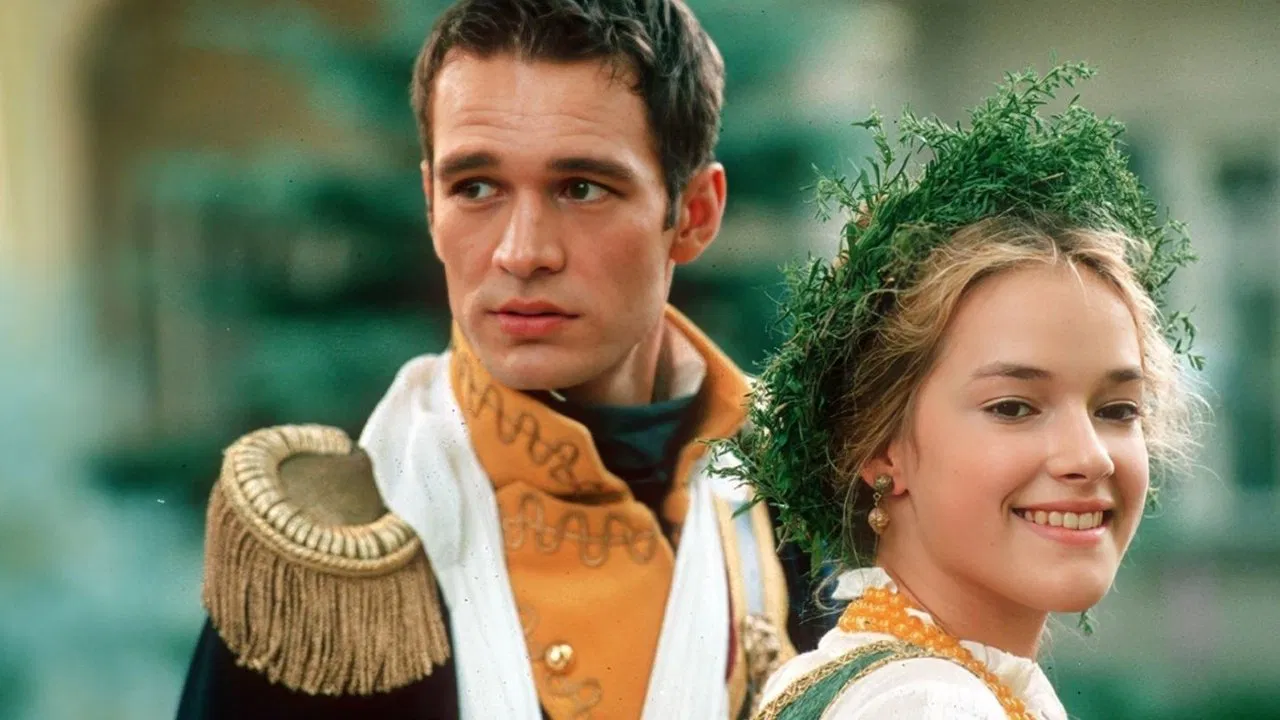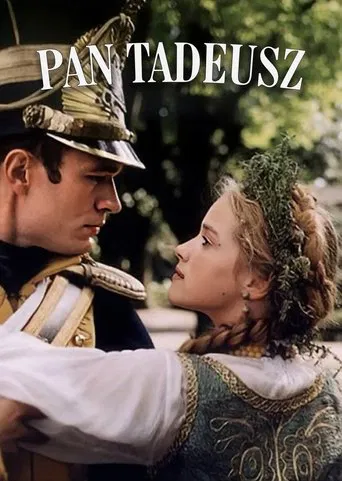

That's very true: this film's redeeming quality (if any) are the dialogues, and also narrator's voice-overs, which have been taken verbatim from "Pan Tadeusz", the Polish 19th century verse epic by Adam Mickiewicz. Mickiewicz was an excellent poet (one of the strongest in Polish language, and of decent standing in European literature of 19th century), and "Pan Tadeusz", written in 1834, is one of his peak works. The text, written in syllabotonic rhymed verse, is at time funny, at times touching, but always flowing and vibrant. The epic tells a story from the lives of Polish lesser gentry in eastern part of the former Commonwealth of Poland (these parts are now in Lithuania or Byelarus) in the times of Napoleon's conquests. The plot includes a little bit of love story, a little bit of war (skirmishes, really), mystery, intrigue, resistance against Poland's occupiers, scenes of everyday life - all with a good measure of nostalgia thrown in, as it was written by Mickiewicz as emigree in Paris, with the patriotic goal to cheer up (literally, in Polish, "to strengthen the hearts") of other emigrees and of Poles in the partitioned and non-existing Poland, at the time shortly after yet another unsuccessful uprising against the Russian Empire."Pan Tadeusz", the movie, is a costume drama directed by Andrzej Wajda, the Polish director with some notable previous work under his belt. Into this film he brings mainly his experience and routine as filmmaker. The acting, with few exceptions, fails to impress, the actors simply mill around and recite the splendid lines by Mickiewicz. The camera-work is passable, with some nice shots of the beautiful locations. Also scenography and costumes are decent. What stands out is the music by the renowned Wojciech Kilar. But then again, it is standing out against the backdrop of a, frankly, not very exciting movie.All in all: the most interesting feature of this film is unfortunately lost in translation from rhymed verse in 19th century Polish.
... View MoreAndrzej Wajda has been a great director at least as far back as "Kanal" in 1957. Tough films, provocative themes.But why the costume drama? I really wish he'd left this one alone.It's not unlike 1999's other bloated Polish historical epic, "Ogniem i mieczem" ("With Fire and Sword"). Here again Poles put aside their differences to prove they're the greatest people, or at least the greatest Slavs, on Bóg's green earth. Rah, rah. A crowd of Polish lesser gentry (rabble) armed with swords can defeat trained Russian musketry any day.And, yes, I am of Polish descent myself, although I'm embarrassed to admit it in this jingoistic context. That's why I was at the special screening in the first place, sponsored by Toronto's Polish newspaper."Pan Tadeusz" shares another characteristic with its elephantine contemporary: its ability to confuse non-Polish-speaking members of the audience with its vast number of characters and their poorly defined interrelationships.Both films too have a sudsy quality. So did "Gone With The Wind", but then character definition makes that historical epic a success. Tadeusz and Zosia are indistinct phantoms as personalities. Certainly no Rhett or Scarlett."With Fire and Sword" is more melodramatic than "Pan Tadeusz", but it's also more exciting. This film has a laudable grandeur which Wajda brings to the proceedings, but still I wish he'd picked a subject with a bit more substance.Wojciech Kilar can be congratulated on his score. And Daniel Olbrychski is always good to see, even with scars all over his head.It should be noted that Polish-speaking spectators at the theatre appeared to find this film quite enjoyable. They would be chuckling at clever turns of phrase in the dialogue, while the English titles would be saying something indescribably prosaic. Evidently the film loses nearly everything in translation.
... View MoreThe best movie I seen in a long time. The Academy of Motion Picture Arts and Sciences should have made this movie a nominee for the FOREIGN LANGUAGE FILM category at the 2000 Oscar's (I think the Academy is biased against such true works of art and history). This movie above all others should have been nominated, what is wrong with the Academy?Excellent movie! Wajda has done an excellent job. Wajda is indeed the world's greatest movie director. Congratulations to Wajda on the Oscar you deserve it more than anyone else.
... View MoreI saw this film last month. It was incredible film - but few people want give this movie the Oscar Award (!) I think that people in America don't understand this movie. Film was created by story Adam Mickiewicz's "Pan Tadeusz" (XIX age). Mickiewicz was the best poet in Poland, but only for us.
... View More